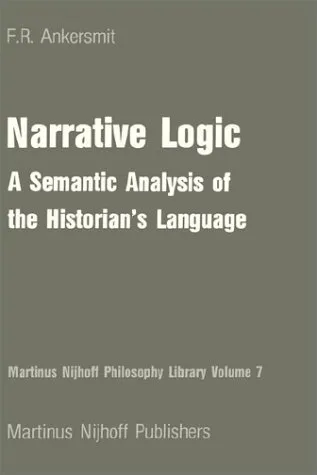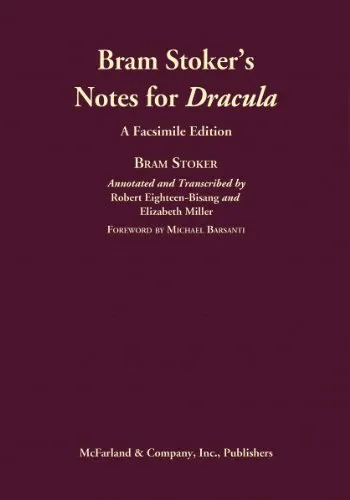Narrative Logic: A Semantic Analysis of the Historian's Language (Martinus Nijhoff Philosophy Library)
4.3
بر اساس نظر کاربران

شما میتونید سوالاتتون در باره کتاب رو از هوش مصنوعیش بعد از ورود بپرسید
هر دانلود یا پرسش از هوش مصنوعی 2 امتیاز لازم دارد، برای بدست آوردن امتیاز رایگان، به صفحه ی راهنمای امتیازات سر بزنید و یک سری کار ارزشمند انجام بدینکتاب های مرتبط:
معرفی کتاب
کتاب "Narrative Logic: A Semantic Analysis of the Historian's Language" نوشته فرانکلین انکرسمیت یکی از آثار مهم در حوزه فلسفه تاریخ و زبانشناسی است. این کتاب با تحلیل گفتمانهای تاریخی از منظر زبانشناختی و منطقی، سعی دارد تا به عمق درک ما از معانی تاریخی و روایتی بپردازد.
خلاصهای از کتاب
در "Narrative Logic"، انکرسمیت به بررسی چگونگی استفاده مورخان از زبان میپردازد و چگونگی شکلگیری روایتها را تحلیل میکند. او بر اهمیت ساختار روایت در شکلدهی به درک ما از وقایع تاریخی تأکید میکند. به عقیده او، زبان نه تنها وسیلهای برای انتقال اطلاعات است، بلکه در خلق معنا نیز نقش دارد. این کتاب به تحلیل ساختارهای روایتی و چگونگی کاربرد عناصر زبانی برای بازنمایی تاریخ میپردازد و نشان میدهد چگونه مورخان از طریق روایت به ساختن تاریخ میپردازند.
نکات کلیدی
- تحلیل زبان به عنوان ابزار مورخان در ساخت روایتها
- نقش منطق نقلی در فهم تاریخ
- بررسی ساختارهای زبانی و مفهومی مورد استفاده در تاریخنگاری
- تفاوت بین تاریخ به عنوان یک علم و تاریخ به عنوان روایت
جملات معروف از کتاب
"زبان، نه یک آینه بیواسطه، بلکه ابزاری خلق کننده است که از طریق آن وقایع تاریخی به روایت تبدیل میشوند."
"تمام تاریخها بیشتر خیالی ناتمام و بیپایاناند که در فرآیندهای زبانی و روایتی شکل گرفتهاند."
چرا این کتاب مهم است
کتاب "Narrative Logic" از اهمیتی ویژه برخوردار است زیرا به مورخان و محققان علوم انسانی این فرصت را میدهد که به شکل عمیقتری به تحلیل گفتمانهایی که با آنها کار میکنند بپردازند. این اثر به ویژه برای دانشجویان فلسفه تاریخ و زبانشناسی مفید است، زیرا استدلالهای منحصر به فردی درباره ارتباط زبان و تاریخ ارائه میدهد. همچنین به پژوهشگران کمک میکند تا ابزارهای تحلیلی پیشرفتهتری برای درک پیچیدگیهای روایتهای تاریخی پیدا کنند.
Introduction
"Narrative Logic: A Semantic Analysis of the Historian's Language" is a seminal work by Franklin Ankersmit that delves into the intricate relationship between narrative forms and historical representation. This book challenges traditional notions of historical analysis by focusing on the linguistics and semantics within historiography, arguing that the language of historians significantly shapes our understanding of history. Through a rigorous exploration of narrative construction, Ankersmit provides an enlightening perspective on how historical narratives are pieced together and challenges the objectivity that is often assumed in historical studies.
Detailed Summary of the Book
Ankersmit's "Narrative Logic" traverses the landscape where historical writing and philosophical analysis intersect. He posits that narratives in history are not mere representations of facts, but are complex constructions that involve creative interpretation by historians. The book is structured around analyzing how linguistic structures and semantics influence the historian's craft. Ankersmit begins with the premise that historical narratives are shaped by narrative choices, which in turn determine how the past is perceived. He dissects the elements of narrative construction, such as temporality, causality, and coherence, and examines how these elements push the boundaries of factual recounting, placing the historian as a narrator who weaves events into a cohesive story.
Ankersmit further explores the implications of narrative logic by discussing the concept of historical representation and the representational nature of historical texts. He argues that instead of simply depicting the reality, historical narratives construct reality, making them subjective interpretations filled with the historian's own context and biases. This standpoint shifts the focus from historical accuracy to understanding the creative elements of historical writing.
Key Takeaways
- The language employed by historians is not neutral; it actively shapes the narrative and understanding of historical events.
- Historical narratives involve choices that highlight certain events while obscuring others, influencing perspectives on history.
- Objectivity in history is challenged, emphasizing the subjective nature of how histories are written and interpreted.
- Narrative construction is pivotal in determining how past events are organized and understood.
Famous Quotes from the Book
"The historical text does not merely recount the past but constructs a past that is meaningful within a narrative framework."
"In history, as in fiction, reality is the outcome of narrative choices."
Why This Book Matters
"Narrative Logic" is crucial as it fundamentally challenges and enriches the methodological paradigms of historiography. By emphasizing the narrative aspect of historical writing, Ankersmit grants new insights into the subjective nature of historical accounts. This book is instrumental in advancing the postmodern view of history, where the focus shifts from the mere pursuit of factual recounting to understanding the narrative construction as a pivotal element of historiography. It fosters a critical approach where readers and scholars alike are encouraged to scrutinize the narratives presented in historical writings and understand the underlying choices that shape these narratives.
Furthermore, Ankersmit's work is significant for broadening the scope of historical analysis beyond traditional empirical methods, incorporating aspects of literary theory and linguistics. This multidisciplinary approach offers historians, philosophers, and readers a richer, more nuanced understanding of how history is conveyed and understood. Through "Narrative Logic," Ankersmit invites an essential dialogue on how narratives inform and often define our comprehension of history and reality itself.
دانلود رایگان مستقیم
شما میتونید سوالاتتون در باره کتاب رو از هوش مصنوعیش بعد از ورود بپرسید
دسترسی به کتابها از طریق پلتفرمهای قانونی و کتابخانههای عمومی نه تنها از حقوق نویسندگان و ناشران حمایت میکند، بلکه به پایداری فرهنگ کتابخوانی نیز کمک میرساند. پیش از دانلود، لحظهای به بررسی این گزینهها فکر کنید.
این کتاب رو در پلتفرم های دیگه ببینید
WorldCat به شما کمک میکنه تا کتاب ها رو در کتابخانه های سراسر دنیا پیدا کنید
امتیازها، نظرات تخصصی و صحبت ها درباره کتاب را در Goodreads ببینید
کتابهای کمیاب یا دست دوم را در AbeBooks پیدا کنید و بخرید
1343
بازدید4.3
امتیاز50
نظر98%
رضایتنظرات:
4.3
بر اساس 0 نظر کاربران
"کیفیت چاپ عالی بود، خیلی راضیام"
Questions & Answers
Ask questions about this book or help others by answering
No questions yet. Be the first to ask!



